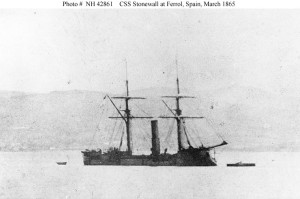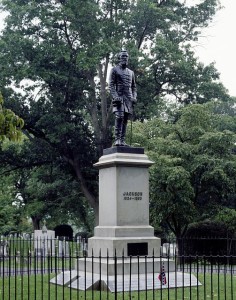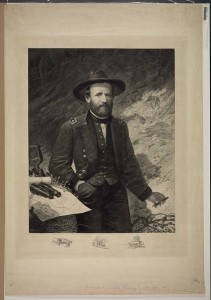150 years ago this month the French-built CSS Stonewall took to the seas. It’s goal was to make its way to the New World to attack the Yankee navy and Yankee commerce.
150 years ago this week a Southern newspaper editorialized about the the good, should-be-emulated qualities of the ship’s namesake.
From the Richmond Daily Dispatch January 6, 1865:
Stonewall Jackson.
“Stonewall Jackson forever,” shouted the crowd at a late English Lincolnite meeting, which was broken up by that and other Confederate names, as the Lincolnite have often been broken up by the great soldiers whose fame has now become universal and immortal.–The renown of Jackson seems to be as fresh and undying abroad as on the day when his glorious star first sank from our horizon. Whilst the whole world did him honor, and the old soldiers of France, who know so well how to appreciate military genius, delighted to hang over the plans of his campaigns, his career seems to have sunk deeply and lastingly into the English heart, and that, as we apprehend, for reasons which it may not be amiss, even at this time of day, for aspirants for military fame to consider.
It was not alone the splendid courage of Jackson which attracted the eyes of the world, for courage in the Confederacy is as common as among the Romans of the Republic. The coward is the exception. Ninety-nine out of every hundred of the Stonewall Brigade were worthy in this quality of their leader.–It was not the evidences of his superior military ability alone, great as that undoubtedly was; but it was the combination of genius in his profession, with tremendous energy, a quality which is to a soldier what “action, action, action,”is to an orator, that composed the broad foundations of his fame. Nor was this all. The English, who are pre-eminently a nation of methodical industry, and who have attained their present greatness by being so, were delighted to find in this illustrious warrior a man who was not afraid to work, who gave as systematic and patient attention to the details of duty as to the operations of the battle-field, and who neither lost a battle nor lost a wagon train. It is a fact, that if any one wanted to find Jackson, he was as likely to find him among his wagons as anywhere else, and that the loss of a few old wagons, which, on one occasion, got stalled in crossing the Potomac, and which, we understand, were the only wagons he ever lost, gave him a distress which, according to the account of an eye-witness, was almost ludicrous.
The English saw at a glance what this man was made of; that he was no dashing soldier of buttons and embroidery, of fuss and feathers; that he was, on the contrary, a thoroughly sincere and honest man, not thinking of himself, but of the business he had in hand, and that, in going about that business, he was as prompt, persistent and practical as he was skillful and courageous. If anything was to be done by Jackson it must be done at once, and done in a workmanlike manner. Whilst his grand figure occupied the foreground in the public eye, it occupied the background in his own. If his name shall survive that of his country, it will be because she had so few such humble and laborious servants; few who, like him, were not only ready to sacrifice their lives, but their ease and all thoughts of self upon her altar.
Would that the spirit of Jackson might live among all our military aspirants! In his courage, great as it was, he has had many equals, but in his forethought, his practicalness, his rapidity, how few! There is a good deal too much talk about cavaliers, and chivalry, and all that.–Common sense and hard work are the things needed now. Jackson understood the enemy we are dealing with. He knew their patient, pains-taking, indefatigable habits of labor, and that these must triumph in the end unless met by corresponding qualities on our part. He has left us a memorable example of those qualities, as well as of the skill, daring and energy of a great soldier. If his example is imitated by the officers of our armies, he will not have lived and died in vain.



